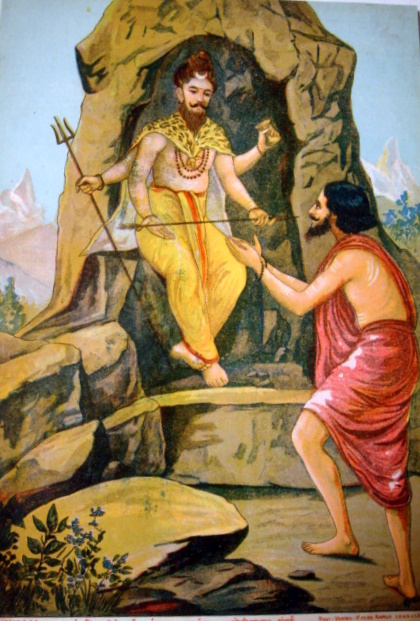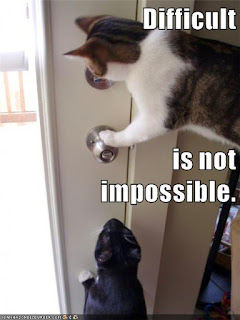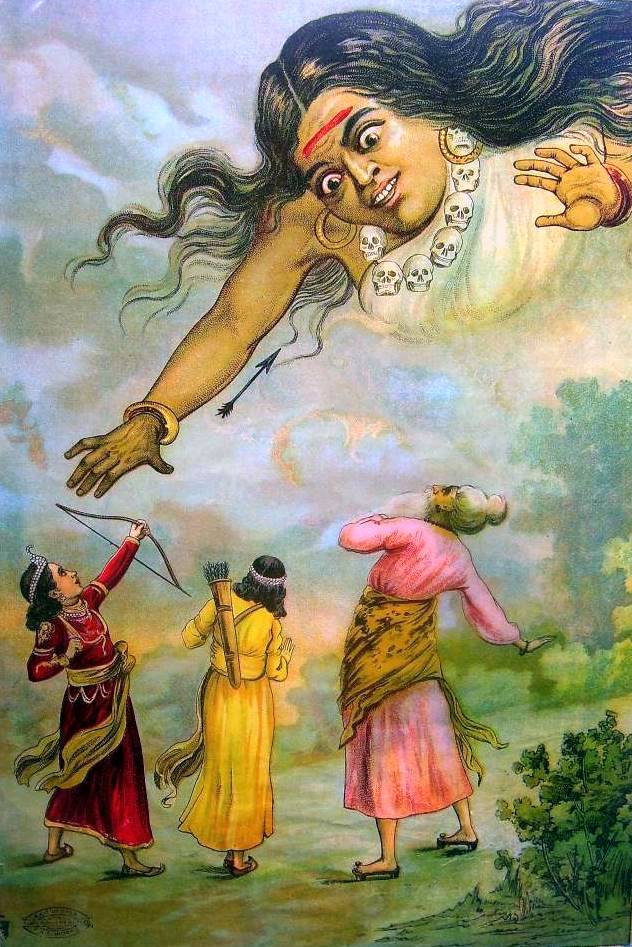 |
| Arjuna receiving weapons from Shiva (Source: wikimedia) |
Arjuna was aggravated; he had already spent seven years in
the wilderness. “When will we have a
chance at exacting our revenge against Duryodhana?” he thought.
Fortunately for Arjuna, change was in the wind for him and
he was about to receive and special knowledge and a mission by
Yudhishthira.
“Arjuna,” said Yudhishthira, “Come, walk with me. I have an important matter to discuss with
you.”
Therefore, Yudhishthira and Arjuna began to walk along the
mountain stream that was near their camp and they came to the small waterfall
that the brothers regularly used to meditate at.
“Arjuna, I know that you are angry about what has happened,
but once again I tell you that it was the will of the gods and they shall allow
us to have our revenge in due time. However,
for now I have a special task for you to undertake. I will teach you a mantra that will allow you
to get weapons from gods and you are to go and gather weapons will we are still
in exile,” said Yudhishthira.
“I will do as you say,” said Arjuna.
So Yudhishthira taught Arjuna the mantra and Arjuna went and
gathered his belongings and said goodbye.
Arjuna journeyed deep into the Vindhya Mountains to
meditate. He then after meditating for a
period spoke the mantra and once again began to meditate. Then one day a hunter appeared before
Arjuna.
“Greetings,” said the hunter, “I am seeking a deer that has
fled onto this mountain, have you seen it?”
“I have not seen it but you are welcome to eat and rest here,”
said Arjuna.
Then the hunter transformed into Shiva who then gave to
Arjuna the astra, pasupatha, and left.
Similar events then occurred with the gods Varuna, Yama, and Kubera and
they all spoke of victory of the kauravas.
After these events occurred, Arjuna decided to travel to another
mountain to meditate and while he was traveling on a mountain path, a chariot
suddenly appeared before him.
“Get in,” said the driver, “and I will take you to
Amaravathi.”
So Arjuna got into the chariot and rode to Indra’s
city. When he arrived, he was greeted
with a great celebration, as he was Indra’s son. Then after the parties had finished, Indra
imparted his weapons and the secrets of them to Arjuna.
“Arjuna, I give you me weapons and the secrets of them. Use them wisely and you will achieve victory
in your coming battles. But it is not
enough to just know of battle so I will have you learn also of the arts of
music and dance,” said Indra.
So Arjuna spent his time learning the arts and one night
when he was meditating, Urvasi came into his room and offered herself to him
because she had fallen in love with him.
But he could not break his ascetic vow and viewed her as one would view
their mother.
“For ignoring me and my advances may you be treated as a
eunuch by women,” said Urvasi.
After a period had passed and Arjuna was preparing to leave
Indra said to him, “The curse is actually a blessing in disguise and it will be
needed in the thirteenth year.”
So Arjuna left Amaravathi, returned to his brothers, and
prepared for war.
Author's note:
The source material for this is
The Mahabharata by R. K. Narayan. This story is based of the original story of Arjuna going and receiving weapons from the gods. I decided to stay close to the source material and focus on expanding on it. I thought it would be interesting to learn more about Arjuna and the events surrounding his time acquiring the weapons.
Bibliography:
The Mahabharata: A Shortened Modern Prose Version of the Indian Epic by R. K. Narayn (1978)


















